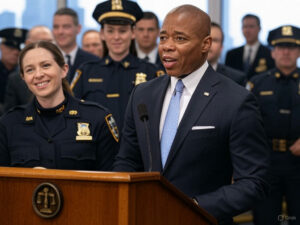A split decision by the Supreme Court on Thursday resulted in a loss for a religious school that had sought access to Oklahoma state funding.
With a 4-4 deadlock, the justices left intact the Oklahoma State Supreme Court’s ruling that it would be unconstitutional for St. Isidore of Seville Catholic Virtual School in Oklahoma City to obtain public financial support. Justice Amy Coney Barrett did not participate in the case.
The Supreme Court issued a brief statement, affirming the previous judgment:
The judgment is affirmed by an equally divided Court.
State officials in Oklahoma argued that providing government funding to a religious charter school would breach the First Amendment.
St. Isidore’s application for public funding was approved by the Oklahoma Statewide Virtual Charter School Board in June 2023, earning the school eligibility for state dollars. The school agreed to admit all students on an open basis “as a traditional public school” and to follow all relevant local, state, and federal education regulations.
At the same time, St. Isidore made clear it “fully embraces the teachings” of the Catholic Church and is involved “in the evangelizing mission of the church.”
Subsequently, the Oklahoma Supreme Court barred St. Isidore from receiving state funds, ruling that financing a religious school violated the Establishment Clause within the First Amendment.
Oklahoma’s Attorney General, Gentner Drummond, took legal action to prevent the school’s charter approval, labeling it an “unlawful sponsorship” of a religious school and describing it as “a serious threat to the religious liberty of all four-million Oklahomans.”
This matter was brought before the Supreme Court, which agreed to consider the case in October.
Last month, Supreme Court justices spent over two hours hearing extensive arguments, revealing ideological divisions over whether to permit St. Isidore to become the first religious charter school in the country.
Two central issues were addressed during the arguments: The first was whether charter schools are considered public institutions—thereby making them subject to the Establishment Clause’s prohibition against government endorsement of religion—or whether they function as private contractors, as the school contended.
The second issue focused on whether Oklahoma’s decision violated the Free Exercise Clause by allegedly placing an excessive burden on the religious character of the school.
This outcome follows a period during which the Supreme Court’s conservative majority has supported the allocation of public funds to certain religious organizations providing “non-sectarian services,” including adoption agencies and food banks.
During discussions, justices considered what degree of oversight and control the state might retain over the school’s curriculum, should the state contract move ahead.
Justices Kentanji Brown Jackson, Sonia Sotomayor, and Elena Kagan questioned school representatives about the institution’s treatment of students from various religious backgrounds who might enroll.
The specific voting positions of each justice were not disclosed.




